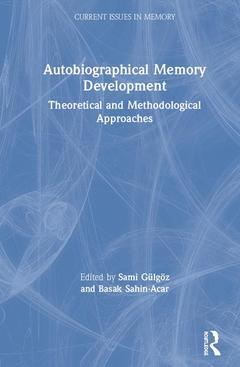Autobiographical Memory Development Theoretical and Methodological Approaches Current Issues in Memory Series
Coordonnateurs : Gülgöz Sami, Sahin-Acar Basak

Autobiographical memory is constituted from the integration of several memory skills, as well as the ability to narrate. This all helps in understanding our relation to self, family contexts, culture, brain development, and traumatic experiences. The present volume discusses contemporary approaches to childhood memories and examines cutting-edge research on the development of autobiographical memory.
The chapters in this book written by a group of leading authors, each make a unique contribution by describing a specific developmental domain. In providing a multinational and multicultural perspective on autobiographical memory development?and by covering a variety of theoretical and methodological approaches, this state-of-the-book is essential reading on the autobiographical memory system for memory researchers and graduate students. It is also of interest to scholars and students working more broadly in the fields of cognitive, developmental, and social psychology, and to academics who are conducting interdisciplinary research on neuroscience, family relationships, narrative methods, culture, and oral history.
Chapter 1: The Emergence of Autobiographical Consciousness and the Construction of an Autobiographical Self by Robyn Fivush
Chapter 2: Socialization of Early Autobiographical Memory by Catherine A. Haden and Pirko Tõugu
Chapter 3: Brain Bases of Autobiographical Memory in Developmentby Patricia J. Bauer
Chapter 4: Is the eye the mirror of the soul? Exploring autobiographical memory development by means of looking-time measures by Peter Krøjgaard, Trine Sonne and Osman S. Kingo
Chapter 5: Narrative Methods in Autobiographical Memory by Azriel Grysman and Cade D. Mansfield
Chapter 6: Developing a view of AMs and self-construal as socially, culturally and historically constructed: A Theoretical and Empirical Approach by Manuel L. De la Mata-Benitez, Andres Santamaria, Mercedes Cubero, Radka Antalikova, Tia Gitte Bondesen Hansen and Samuel Arias
Chapter 7: Content and Consistency of Earliest Memories by Berivan Ece & Sami Gülgöz
Chapter 8: Autobiographical Memory Development and Self-Construals Within and Across Cultures by Basak Sahin-Acar and Michelle D. Leichtman
Chapter 9: Remembering Earliest Childhood Memories by Carole Peterson
Chapter 10: How did you feel back then? Emotional Memory Conversations among Mother-Father-Child Triads by Elif Burumlu-Kisa and Basak Sahin-Acar
Chapter 11: Adults’ Memories of Childhood: The Beginning of the Life Story by Majse Lind, Susan Bluck and Hanna Åkerlund
Chapter 12: The Development of Children’s Autobiographical Memory for Learning Episodes by Michelle D. Leichtman, Rhyannon H. Bemis, Kaitlin A. Camilleri and David B. Pillemer
Chapter 13: PTSD in Youth from a Developmental Perspective by Inge Lise Lundsgaard Kongshøj and Annette Bohn
Chapter 14: Final Discussion and Looking Forward by Basak Sahin-Acar & Sami Gülgöz
Sami Gülgöz is Professor of Psychology at Koç University in Istanbul. His current research focuses on memory in applied contexts and particularly on autobiographical memory in relation to social and individual characteristics.
Basak Sahin-Acar is Assistant Professor of Psychology at Middle East Technical University. She is also affiliated with the interdisciplinary program of Gender and Women's Studies. Her research interests include autobiographical memory development within and across cultures, as well as the effects of self-construals and familial context on this development.
Date de parution : 06-2020
15.6x23.4 cm
Date de parution : 06-2020
15.6x23.4 cm
Thème d’Autobiographical Memory Development :
Mots-clés :
Autobiographical Memory Development; brain development; Autobiographical Memory; Family Member Type; cutting-edge research; Autobiographical Memory Skills; childhood memories; Turkish Cultural Context; Scaled Coding Systems; Flashbulb Memories; Memory Development; Reminiscing Style; Autobiographical Memory Research; Childhood Amnesia; Early Memories; Autobiographical Memory System; Children’s Autobiographical Memory; Children’s Earliest Memories; Mother Father Child Triads; Memory Conversations; Parent Child Conversations; Socioeconomic Development; Retention Intervals; Autobiographical Memory Retrieval; Ptsd Symptom; Conversational Turn Taking; Investigating Age Differences; Specific Past Events



